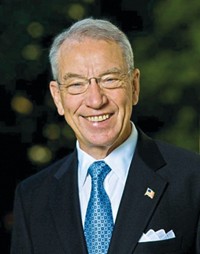Advertisement
Grab your lab coat. Let's get started
Welcome!
Welcome!
Create an account below to get 6 C&EN articles per month, receive newsletters and more - all free.
It seems this is your first time logging in online. Please enter the following information to continue.
As an ACS member you automatically get access to this site. All we need is few more details to create your reading experience.
Not you? Sign in with a different account.
Not you? Sign in with a different account.
ERROR 1
ERROR 1
ERROR 2
ERROR 2
ERROR 2
ERROR 2
ERROR 2
Password and Confirm password must match.
If you have an ACS member number, please enter it here so we can link this account to your membership. (optional)
ERROR 2
ACS values your privacy. By submitting your information, you are gaining access to C&EN and subscribing to our weekly newsletter. We use the information you provide to make your reading experience better, and we will never sell your data to third party members.
Policy
Patent Reform: Revived Subcommittee To Focus On Intellectual Property
by Glenn Hess
January 17, 2011
| A version of this story appeared in
Volume 89, Issue 3
One area of possible collaboration between the White House and Capitol Hill Republicans is intellectual property (IP). The leadership of the House Judiciary Committee has shifted from Rep. John Conyers Jr. (D-Mich.) to Rep. Lamar S. Smith (R-Texas), a leading proponent of overhauling the U.S. patent system.
“We need to improve our patent system to better protect intellectual property and help ensure that good patents are approved more quickly,” Smith said in a recent statement outlining his agenda. “There is bipartisan support for much-needed revisions to our patent system, which has not been significantly updated in over half a century.”
COVER STORY
- - Congressional Outlook For 2011
- - Energy & Environment: Controlling CO2 Emissions Remains A Divisive Issue
- - Homeland Security: Chemical Plant Regulations are Still Up For Debate
- - Consumer Protection: Expect Action On Product, Drug Safety
- - Chemical Regulation: TSCA Reform Takes A Backseat
- - Patent Reform: Revived Subcommittee To Focus On Intellectual Property
- - Trade: Expect Early Approval Of South Korean Trade Deal
- - Rail Transportation: Update To Freight Rail Competition Policy Is In The Works
- - Science Policy: Oversight And Reauthorization Will Dominate Activity
Smith has been a strong advocate for patent reform over the past several years, even reaching across the aisle to work with Democrats. He cosponsored the Patent Reform Act of 2007, which passed the House but failed to clear the Senate.
Signaling that the next Congress will likely have a strong interest in IP issues, Smith announced on Dec. 20 that he was reviving a tech-related subcommittee that will focus on copyright, patent, trademark, and information technology matters.
“A separate IP subcommittee will ensure that the committee remains focused on all aspects of intellectual property, including patent reform and copyright protections,” Smith said. The Subcommittee on Intellectual Property, Competition & the Internet is expected to be chaired by Rep. Robert W. Goodlatte (R‑Va.).
The new panel replaces one that Democrats disbanded when they took control of the House in 2006. The Democrats moved IP-related issues to the full committee, where they got a larger audience but the focus was less intense.
Smith indicated that patent reform will be part of the GOP’s job-creation agenda. Legislation will be introduced after hearings are held. “We will have our own product,” he said.
Senate Judiciary Committee Chairman Patrick J. Leahy (D-Vt.) has also made patent reform a high priority. But lawmakers have had trouble balancing the conflicting concerns of a diverse array of stakeholders that includes technology companies, the pharmaceutical industry, universities, and organized labor.
Last April, Commerce Secretary Gary Locke noted in a letter to Leahy that “the Administration is eager to see patent reform enacted.” The department endorsed Leahy’s patent reform bill, saying it would help fuel economic growth and job creation by streamlining and strengthening the patent process.
However, the proposal stalled after high-tech companies such as Intel, Google, and Apple declared their opposition to the bill, arguing that it would not do enough to rein in damages awarded in patent infringement lawsuits.
Observers disagree about whether the House and Senate will be able to resolve their differences. “With the complexity of the issues and the polarization of the interests involved, it is unlikely that an agreement will be reached that will allow extensive patent reform to be adopted in the next few years,” says Anthony Trippe, chair of the Patent Information Users Group and a director of 3LP Advisors, an IP investment advisory firm.
Consequently, Trippe says, lawmakers should separately address “critical items that are needed to sustain an innovation economy,” such as reserving the money raised from patent fees for exclusive use by the Patent & Trademark Office. “The U.S. should be investing in the patent office as opposed to looking to it to raise funds” for other unrelated government programs, he declares.
But Matthew P. Becker, a patent attorney at the Chicago law firm Banner & Witcoff, thinks the revival of the IP subcommittee in the House “will provide increased emphasis on the patent reform act and should help secure its passing.” Because patent reform can be a bipartisan issue and is pitched as creating jobs, he expects some sort of patent reform legislation will clear Congress in the next two years.






Join the conversation
Contact the reporter
Submit a Letter to the Editor for publication
Engage with us on Twitter